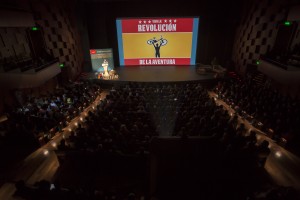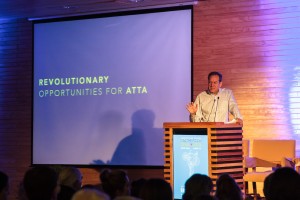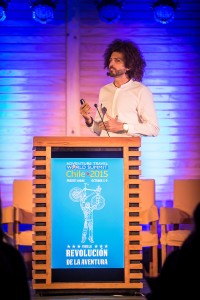
The Adventure Travel Trade Association wanted a theme for its annual Summit that would inspire the industry to be bigger than itself. So, at ATWS 2015 in Chile, when people embraced or chanted “Viva la Revolucion de la Aventura!” they weren’t just referring to more sustainable travel operations. The Revolution we spoke of in Chile was an all-encompassing one -- big and small shifts we could make as individuals and as organizations to change the world we live in.
And so, in addition to inviting revered speakers from the travel and conservation spaces, we also brought in a diplomat, a chef and a mountaineer of the mind.
Instigating a Revolution the Diplomatic Way

Former Canadian Ambassador Tim Martin has been at the forefront of peace and security work in Latin America, Afghanistan, the Middle East and Africa. He led the Kimberley Process that banned blood diamonds and changed an industry permanently and for good. “The market was ethically blind,” he says about the diamond industry. That revolution had to be driven by businesses to create a new ethical standard that wouldn’t tolerate corrupt source markets.
Martin points out all the revolutions going on around us right now: globalization, huge shifts in technology, adoption of green energy, medical advances that allow us to live longer and human rights for groups like LGBT communities. When you start looking at everything that is changing before your eyes, you can tune in to the places where you are provoked to get involved.
The tourism industry is ripe for a revolution (Martin jokes that tourism is the world’s second oldest profession). By outlining the diplomatic process and breaking it down into logical steps, he explains to the adventure travel industry exactly how this can be done in our space:
- Find like-minded partners
- Create a safe space for the revolution to occur
- Stay focused and don’t try to change too much at one time
- Identify and follow good leaders
Ingesting the Revolution

Rodolfo Guzman is not just a top chef. He believes the real power of food is as a catalyst for change. Eight years ago the restaurant he now heads, Borago in Santiago, was on the verge of closing. Guzman entered the scene determined to create new value on endemic Chilean ingredients. His goal: tell the story of Chile’s terrain, people and culture through food. Chef Guzman is considered a visionary on the world culinary stage and he sources his table from a network of over 200 foragers, fisherman and farmers.
“In my mind, there’s no difference between gastronomy and tourism,” he tells ATWS delegates and expresses that there is a lot of knowledge these two circles can and should share with each other. His focus is on preserving and displaying Chile’s rich cultural and natural resources...isn’t that what adventure travel is trying to do as well?
There are 200 people behind the dishes that come out of Guzman’s kitchen. And this is not an assembly line of sous chefs and dishwashers. Eighty percent of the food comes from small farmers’ fields. “We need to be proud of who is picking our food,” he says, “so maybe we can feel proud when we eat it.”
Guzman spoke to ATWS as part of a plenary session called “Passionate People” and it’s clear that he’s intensely passionate about food and the landscape of Chile. His restaurant is very popular (it’s the second highest rated restaurant in all of Latin America) but he wants to make sure that the audience knows that “this is not a trend….this is about our land.”
WATCH: Rodolfo Guzman’s “Power of Food”
Life as a Revolution

Omar Samra sees his life as a series of revolutions. When he was just a young boy he developed asthma and started running to strengthen his lungs in spite of the disease. He climbed his first mountain at age sixteen and just kept climbing until he became the first Egyptian to climb the seven summits, which included being the first Egyptian to reach the top of Everest.
But Samra wasn’t invited to speak at ATWS just because he is an accomplished adventurer. All of his mountaineering ended up being training for an even bigger challenge -- the kind you can’t usually train for. In 2013, Samra’s wife died within a few days of delivering their first child. Life’s biggest adventure became picking up the pieces of his life after this tragedy.
He started a toy drive that collected thousands and thousands more toys for orphans than he ever dreamed. And while his charity work helped him feel like he was contributing something to an unfair world, it wasn’t enough to help him put his life back together. He turned again to exploration and decided to ski to both poles. Samra tells the audience he cried all the way to the South Pole and when he got there, he had a brief feeling of euphoria and then nothing. On an even more difficult journey to the North Pole, he says he learned how to love without attachment. Cold and isolated in his tent one night on that journey, he was finally able to let go of his wife.
Samra says his purpose on Earth is to heal and to help others heal. In fact, he says that this is everyone’s purpose. Physical feats of accomplishment are pale shadows of what we are able to overcome emotionally. His “Passionate People” presentation earned a standing ovation from the audience and there wasn’t a dry eye in the room.
WATCH: Omar Samra’s “Mountains of the Mind”
